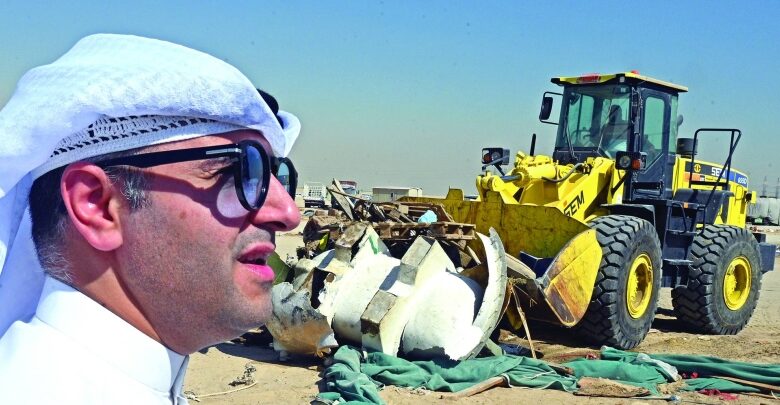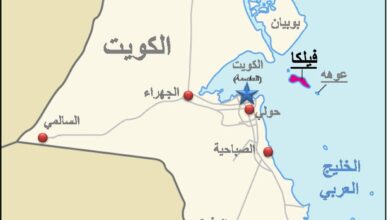
• Abdullatif Hamed Hamad Al-Mishari, the Minister of State for Municipal Affairs and Housing Affairs, stated, “We will not tolerate random construction and violations in the desert. We have initiated the removal process with a dedicated team, starting in the southern region and moving north to address all desert areas in Kuwait.”
• The 90-day campaign to remove encroachments on state property will organize land use and provide designated grazing areas for livestock owners. Violators are urged to take immediate action to remove their encroachments.
Abdullatif Hamed Hamad Al-Mishari, the Minister of State for Municipal Affairs and Housing Affairs, emphasized the importance of not being lenient and urged all efforts to eliminate slums and violations in desert areas, according to Al Rai newspaper.
Al-Mishari stated in a press release on the sidelines of his attendance and supervision of the campaign to remove encroachments on state property in the south of the country (Wafra Road 306) on Monday, “We have initiated an organizational campaign for the slums in the Kuwaiti desert from the south to the north.”
He noted that the campaign is being carried out according to a specific technical and time plan aimed at removing slums and violations in desert areas, in cooperation with various state agencies.
He added, “This campaign will organize the affairs of all land users, and we will work to provide designated areas for livestock owners to graze. We will implement specific procedures to register each livestock owner so that we know who is utilizing these areas; anything else will be removed.”
Al-Mishari pointed out that there is a coordinated effort among various state agencies, including the Kuwait Municipality, the Ministries of Interior, Defense, and Finance, as well as the Public Environment Authority and the Public Authority for Agriculture.
He indicated that “regarding the provision of temporary sales points in the desert for fodder near grazing areas, there will be additional arrangements with the Ministry of Industry and Commerce to identify locations that could benefit livestock owners in areas outside the organized zones.”
He stressed his awareness of citizens’ needs and the importance of providing them with necessary services, adding, “We will not tolerate the random construction and violations currently occurring in the desert. We have begun the removal process, and a team has been formed for this purpose, consisting of all parties working in the field. We have started in the southern region, and we will then move to the northern region, covering all desert areas in Kuwait.”
In turn, Engineer Abdullah Al-Jaber, head of the team for removing encroachments on state property at Kuwait Municipality, stated, “The campaign began in the first area on Al-Wafra Road 306, which is considered a parallel market to Safat Al-Ghan, and this market is, of course, illegal. This campaign will continue until the phenomenon of encroachments in these areas is eliminated in accordance with the law.”
Al-Jaber added, “We have divided the southern region into six work areas, with six teams assigned to remove the encroachments in each. These teams are tasked with addressing all forms of encroachments, which can take multiple forms. He pointed out that the Public Authority for Agriculture is responsible for livestock owners and provides us with direct instructions regarding whether or not to register livestock with them. Livestock owners will be granted temporary permits until a mechanism and permanent locations are established for them, while other encroachments will be removed immediately.”
He noted that violations and encroachments are being monitored, and removal measures will be taken in accordance with the law. He indicated that the campaign will last for 90 days and called on violators to take the initiative to remove their encroachments immediately.
For her part, Dalal Al-Najjar, Head of the Inspection Department in Ahmadi Governorate at the Public Environment Authority, confirmed the existence of numerous environmental violations.
She stated, “The campaign continues to monitor and issue environmental violations to those who break the law, and we cooperate directly with the Ministry of Interior, represented by the Environmental Police, in all environmental seizures,” stressing that inspection campaigns will continue in the southern region of the country while monitoring violators in cooperation with relevant state agencies.
Establishment of slaughterhouse in the southern region
Regarding the establishment of a slaughterhouse for the residents of the southern region (Sabah Al-Ahmad, Al-Wafra, and Al-Khairan), Al-Mishari stated, “We will assess the needs of the residents in these areas and provide them with what they require based on our expertise and the correct mechanisms. However, the random slaughterhouses that we witnessed during this campaign pose health and environmental risks, as they are unsanitary and lack proper supervision.”
No change to camping procedures
Regarding camping procedures, Al-Mishari explained, “The situation remains the same as in previous years. There are specific times and locations designated by the municipality, along with controls and procedures for registration via the municipality’s website to establish camping sites. This process is consistent every camping season, including the payment of specified fees, and these procedures will not change.”
Violations and encroachments
1. Unlicensed feed outlets.
2. Random illegal slaughterhouses.
3. A sheep market operating parallel to the official sheep market.
4. Selling illegally subsidized feed.
5. Placing earthen barriers and damaging wildlife.
6. Employing workers who violate residence laws.
7. Unlicensed mobile grocery stores.
8. Fencing and enclosing land for sale during the camping season.
9. Exploiting state property for commercial purposes without obtaining usufruct rights.
400 stolen water tanks seized
The municipality announced that it had confiscated a makeshift market established by illegal workers, which housed 400 stolen water tanks of various sizes in the southern region of the country.
The municipality explained in a statement that inspection teams in Ahmadi Governorate had monitored the violations in the field and confronted the perpetrators who were exploiting them commercially without obtaining licenses from the relevant authorities.













